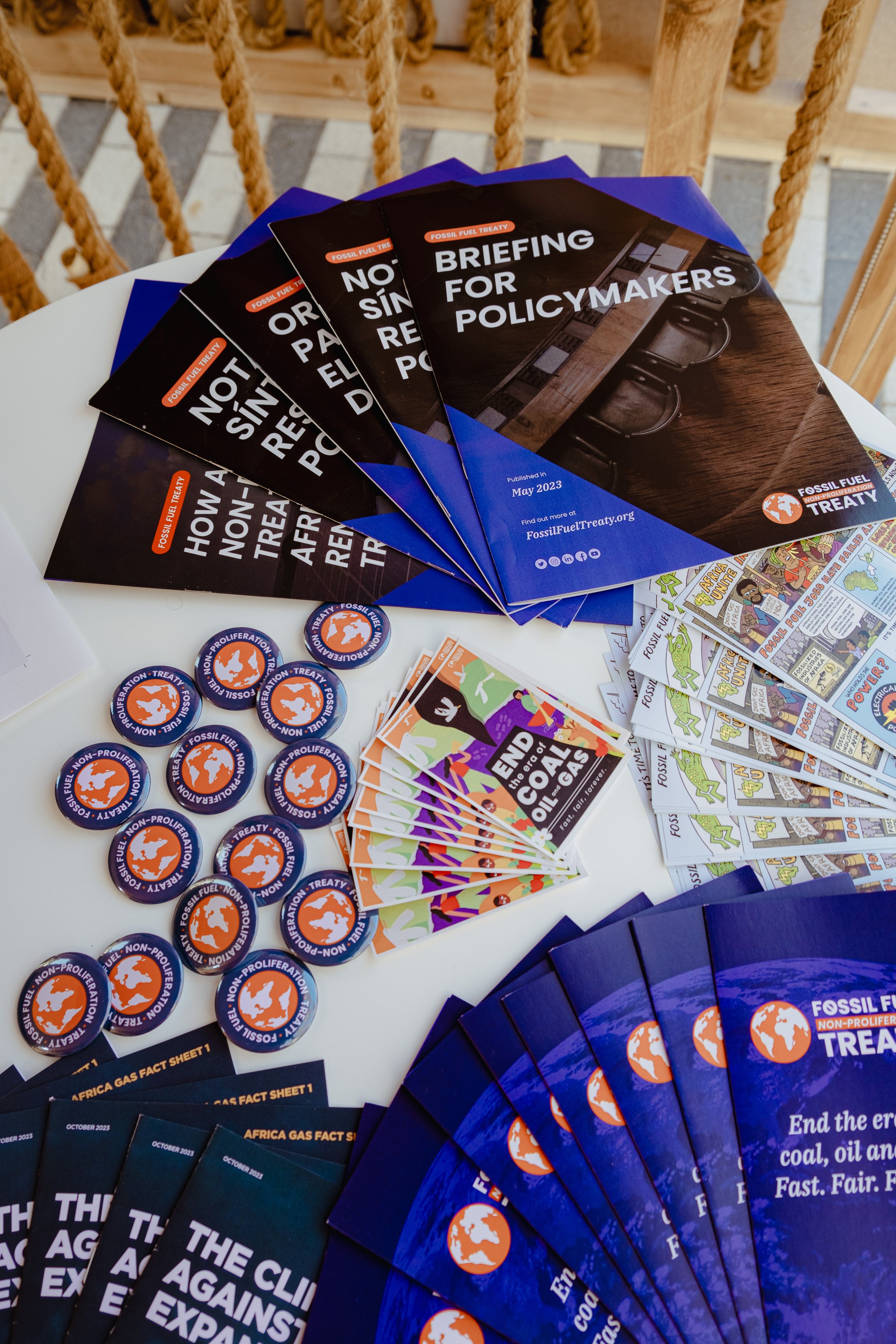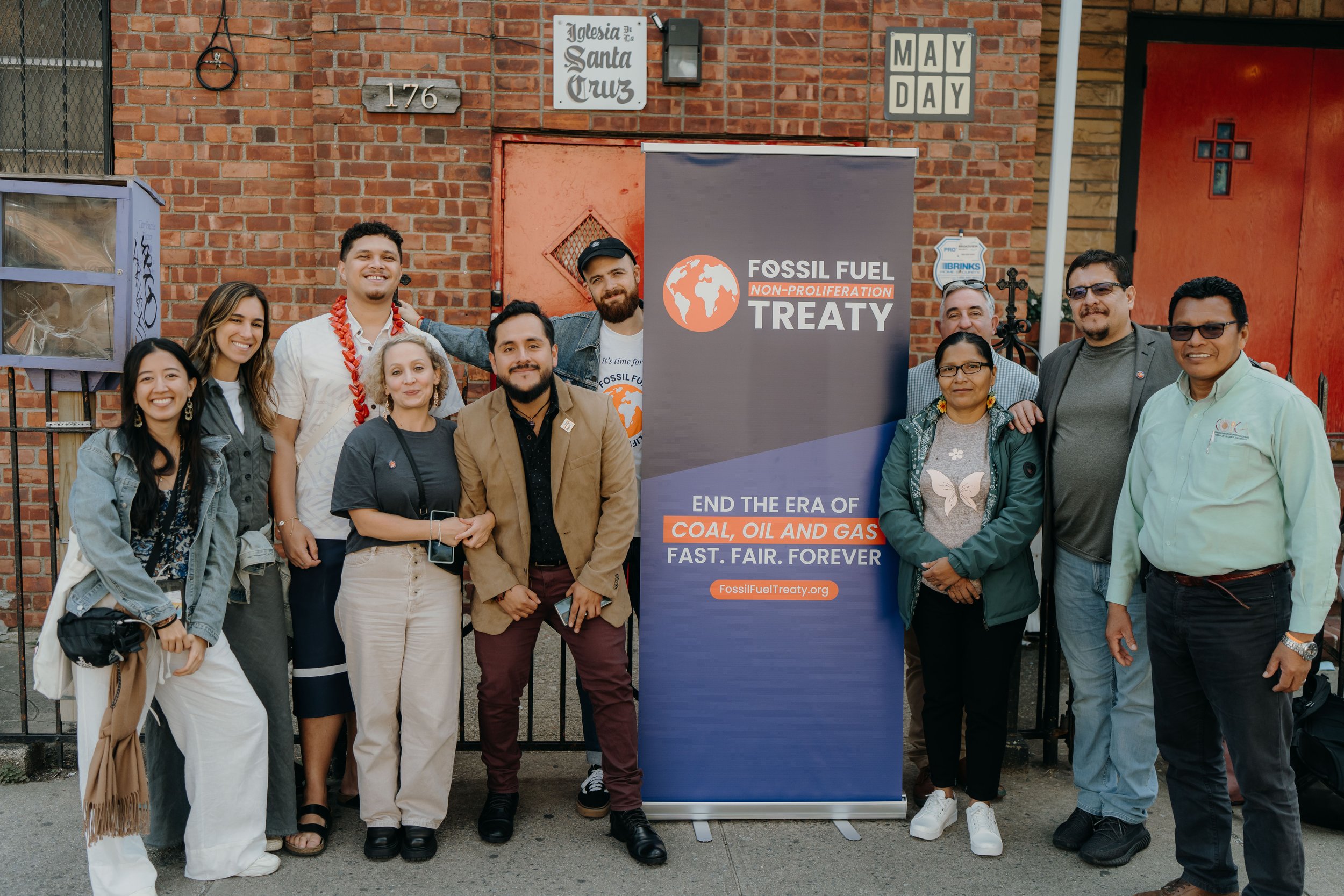COMMUNICATIONS & MEDIA RESOURCES
Below are communications and media resources related to the Fossil Fuel Non-Proliferation Treaty Initiative, including our most recent publications, photos, backgrounders, and assets.
Asset LibraryIf you need Treaty branded materials for an upcoming event, download and access our Asset Library which includes stickers, banners, t-shirts, zines, and placards in both English and Spanish
Fossil Fuel Glossary of Terms-
Fossil Fuels: Oil, gas and coal are weapons of mass destruction. They are not only the primary cause of the climate crisis but also a major threat to our health, world peace, biodiversity and economic well-being.
Energy sources such as oil, gas and coa that come from decomposed and fossilized plants and animals, stored inside and between sedimentary rock deposits in the ground. Preference to put oil and gas first, and coal afterwards.
-
Non-Proliferation: Working together to end the expansion of threats such as landmines, nuclear weapons and fossil fuels.
The Fossil Fuel Non-Proliferation Treaty is the full name of the initiative. Feel free to use ‘the Fossil Fuel Treaty’ as a shorthand. Avoid only using ‘treaty’ alone which assumes understanding and doesn’t convey the purpose of the initiative. Avoid using FFNPT as this is jargon most people won’t understand.
Preference to use the name in capital letters, and always add ‘Initiative’ when referring to us as a campaign/project (e.g. “this event is held by the Fossil Fuel Treaty Initiative) or ‘proposal’ if referring to the policy proposal (e.g. endorse the Fossil Fuel Treaty proposal)since an actual treaty does not yet exist.
This means developing the plan that would allow governments to stop building out the problem by ending the expansion of coal, oil and gas production.
-
Fossil Fuel Industry: The companies making record profits finding, extracting and selling coal, oil and gas through the poverty and historic injustices lived by others. There are less than 100 fossil fuel companies responsible for the majority of production. Aim to use this rather than ‘Big Oil’ which implies a huge industry that is very hard to phase out.
-
Fossil Fuel Phase Out: Ending expansion of oil, gas and coal and phasing out existing production of fossil fuels at a rate consistent with tackling the climate crisis by remaining below the Paris Agreement’s 1.5 degree Celsius temperature limit with a focus on ensuring no community or country is left behind.
Avoid using the term “fossil fuel phase down” given this term is being used in international negotiations to create loopholes for inaction and avoid the term “managed decline” as well, which is associated with end of life management from a personal health standpoint. Avoid only focussing on a ‘coal phase out’ which is often used to justify ongoing oil & gas expansion.
-
Extraction: Taking fossil fuels out of reserves and making them available for commercial and industrial use. Extraction is also a term used to describe unjust economic, human rights and environmental practices on communities living on the frontlines of fossil fuel production as well as the removal of resources and capital from the Global South by the Global North.
Use ‘extraction’ rather than ‘production’ or ‘supply’ when possible.
-
Paris Climate Agreement: The Paris Climate Agreement is an internationally binding climate agreement that was adopted in 2015 at a United Nations climate conference to limit warming to 1.5C. For the first time, almost all countries agree to limit warming including 193 nations and the European Union. Under the agreement, countries must set their own emission reduction targets called Nationally Determined Contributions (NDCs) and revisit them every five years. While extremely important, the Paris Agreement unfortunately does not mention fossil fuels nor does it outline the need for and the pathway to a just transition away from oil, gas and coal.
-
Just Transition: A “Just Transition'' means equitably transitioning away from fossil fuels and meeting climate goals by ensuring the whole of the world and its societies – countries, communities, workers, social groups – are a part of the journey and experience its benefits as well as its trade offs. The International Labour Organization (ILO) defines it as: “Greening the economy in a way that is as fair and inclusive as possible to everyone concerned, creating decent work opportunities and leaving no one behind.” The UNFCCC Just Transition Work Programme, launched in 2023, outlined “the need to ensure just transitions that promote sustainable development and eradication of poverty, and the creation of decent work and quality jobs, including through making financial flows consistent with a pathway towards low greenhouse gas emissions and climate-resilient development, including through deployment and transfer of technology, and provision of support to developing country Parties.”
Just Transition on its own doesn’t mean much to most people according to research done by Potential Energy and Yale University. It is okay to use in policy circles but aim to clearly describe what is meant for other audiences. Try “A fast and fair/equitable shift away from oil, gas and coal that leaves no community or country behind.”
-
Global South and Global North: The Global South refers to various countries around the world that face a similar mix of political, geopolitical and economic factors. They are sometimes called ‘developing nations’, the term Global South better reflects the growing economic power of countries such as India, China and Brazil, and is the preferred term to use. Many are in the Southern Hemisphere, largely in Africa, Asia and Latin America, yet China and India are in the Northern Hemisphere. In general, Global South countries have less wealth, higher levels of income inequality and suffer lower life expectancy and harsher living conditions than countries in the “Global North” which are richer nations that are located mostly in North America and Europe, with some additions in Oceania and elsewhere.
Use Global South and Global North rather than ‘developing’ or ‘developed’ countries where possible.
-
Imperialism, Colonialism, Neo-Colonialism: Imperialism is state policy, practice, or advocacy of extending power and dominion. Imperialism enables the systematic transfer of resources to the imperial core of the capitalist world system that started about 1500. Western colonialism is a political-economic phenomenon in which European nations (Portugal, Spain, the Dutch Republic, France and England) explored, conquered, settled and exploited large areas of the world and spread European institutions and culture. Settler colonialism refers to a minority group that establishes power by assimilating and/or oppressing Indigenous peoples. Neo-colonialism is the deliberate and continued survival of the colonial system through political, economic, social, military and technical forms of domination directed at colonized territories and people.
-
Greenwashing: Greenwashing is a tactic used by fossil fuel companies to deceive the public by presenting themselves as being part of the solution through sustainability commitments while avoiding meaningful action.
Tricky Terms to Pay Attention to-
Net Zero: The target of getting rid of all greenhouse gas emissions through efforts to cut them and absorb and store what cannot be cut.
It is important to point out that Net Zero pledges are commonly made by fossil fuel companies to highlight they are part of the solutions yet are an example of greenwashing given these big polluters do not have clear and realistic plans on how they will cut and capture emissions.
‘Net zero emissions’ refers to achieving an overall balance between greenhouse gas emissions produced and greenhouse gas emissions taken out of the atmosphere. To avoid a climate catastrophe, greenhouse gas emissions must be as low as possible. In other words, we need to get as close as possible to real zero, and only rely on carbon offsetting when it is absolutely necessary. This means that we need to rapidly phase out all fossil fuels – coal, oil and gas – and transition to clean and fair renewable energy sources across all sectors of the economy.
-
Dangerous Distractions via Unproven Technologies: This phrase can be used to call out CCUS, CCS (see below), geoengineering, dodgy carbon offsets and other proposed solutions that are used as arguments to perpetuate fossil fuel extraction. Avoid the term ‘false solutions’ which is murky and doesn’t convey the scale of the threat.
Carbon Capture, Utilization and Storage (CCUS): CCUS is a technology that has not been proven to scale sufficiently. It involves the capture of carbon, generally from large point sources like power generation or industrial facilities that use either fossil fuels or biomass as fuel. If not being used on-site, the captured carbon is compressed and transported by pipeline, ship, rail or truck to be used in a range of applications or injected into deep geological formations such as depleted oil and gas reservoirs or saline aquifers. Make the case that while there are approximately 500 CCUS projects in development around the globe, according to the International Energy Agency, there are not enough proven projects to keep warming to 1.5C. CCUS is used by fossil fuel companies as a key method they will rely on to become net zero despite the technology not yet being proven or at scale.
-
Unabated Emissions: This is one of the terms used by country negotiators at the United Nations climate talks to avoid action. What abated emissions means is not commonly defined and therefore unabated is also not defined. It is typically used in conjunction with the assumption that CCSU will be able to capture the majority of carbon pollution.
Point out that carbon pollution from fossil fuel current extraction and production is not currently being adequately addressed and there is no more room to add more by expanding the problem.
-
Inefficient Subsidies: Inefficient subsidies is another term used to weaken climate negotiations. What inefficient subsidies are is also not commonly defined and leaves room for countries to claim they have none nor commit to take steps or a timeline for action.
Counter that countries around the world dump more than 7 trillion taxpayer dollars into oil, gas and coal companies in 2022 alone. An industry making record profits that doesn’t need our money yet that we are paying to drive the climate crisis, kill one in five people annually from air pollution, drive wars and destroy ecosystems and local economies. Any further subsidies are the epitome of inefficiency.
-
(Critical) Minerals: Minerals such as copper, lithium, nickel, cobalt and rare earth elements are essential components in many of today’s rapidly growing clean energy technologies – from wind turbines and electricity networks to electric vehicles. While important, mining for these minerals will place the environment and people at risk, particularly those in the Global South and Indigenous communities, if done in a way that replicates current extractive, neo-colonial systems.
Try to avoid using the word ‘critical’ with minerals given this term perpetuates arguments that these resources are needed no matter the cost.
-
Clean, renewable energy: Energy that comes from the wind, water, sun and earth that doesn’t run out.
Use clean and renewable energy together given these words are often used on their own to describe fossil fuels such as clean coal or renewable “natural” gas. Caution about describing the transition as just going from dirty to clean energy as this leaves out the need for economic diversity, community decision making and self-determination. Avoid saying ‘low carbon solutions’ or just ‘cleaner energy’ – frames often used to greenwash gas.
Fossil Fuel Treaty VideosWatch all videos on the Fossil Fuel Treaty’s Youtube Channel
Additional ResourcesConnect with us for live updates Contact us.For media and event enquiries contact media@fossilfueltreaty.org – this email is being monitored 24/7 by our global communications team.
Nathália Clark (Rio de Janeiro)
nathalia@fossilfueltreaty.org
+1 909 536 9714
Viviana Varin (Paris)
viviana@fossilfueltreaty.org
+33 6 63 48 52 67






